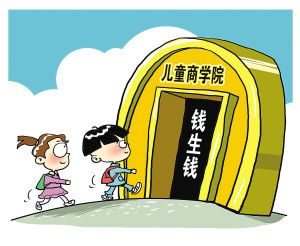Business school for kids
 0 Comment(s)
0 Comment(s) Print
Print E-mail China.org.cn, April 4, 2013
E-mail China.org.cn, April 4, 2013

On the evening of March 22, eight-year-old Li Qicheng steps out of a limousine in the High-Tech Park of Chengdu city in Southwest China. As heir to a billionaire, he had a class in money quotient training that night at an institute referred to as a"children's business school."
After a security check, Li went into his classroom which is monitored by a 24-hour surveillance camera. Li has four classmates, three boys and one girl, who are on average eight-years-old. Classes that evening were aimed at understanding a shopping list and how to draw up a budget.
The teacher raised a question: With 50 yuan (US$8), what should you buy for a trip to the Happy Valley theme park? The children's answers varied from a water bottle, swim ring and backpack to jewelry. The teacher wrote down all the answers and taught them how to select their items based on the specific situation.
Next up was the treasure hunt game. The children were asked to pick valuable things out of a treasure box. Most of them rejected the spoons, toothbrushes and woks, but kept the jewelry and gold. Teacher told them that if you were in an isolated island, spoons, toothbrushes and woks are more valuable than jewelry and gold. Through the game, the children were expected to understand that value is relative and varies in different circumstances.
Li likes to study here. "I am relaxed in the classroom. And these extracurricular exercises are more interesting than those of the mathematical Olympiad (an advanced math class), "he told Chengdu Business Daily.
Seven-year-old Ren Shuxiu is a little princess. The money in her pink purse is never under 1000 yuan (US$ 161) per day. When teacher first asked her to make a budget, she planned to buy a 1000-yuan item with only 20 yuan. She had no idea about money then. But after attending the class, her mom said that Ren likes to make a shopping list when she goes shopping with her parents and can do things in a planned way.
So far, 40 little heirs or heiresses to wealthy families have received training here. The youngest is only seven while the oldest is 11. Different ages take different classes. The tuition fees are 30,000 yuan (US$4,838) a year for a three-hour class per week. To complete the full training one needs to pay double.
At present, the school has four full-time teachers. Most of them are former English teachers in public elementary schools. 30-year-old Suya taught English in a public elementary school for eight years. Her annual salary was raised by one third after she started working here last year. She also got a certificate in money quotient training in the U.K.
The training is sponsored by the institute. As the class period is only three hours per week, teachers can teach pupils one-on-one. According to Suya, the school has also employed part-time specialists in money quotient education in the U.K. They come to teach here every three or four months.
According to a random interview with 30 parents conducted by the paper, most parents think the tuition fees are a little bit high and they doubt about the effect of the training. Some parents think the purpose of the training is right. It's good to let the rich kids get a correct understanding of money. Others, however, are worried that knowing money in one's childhood will make him or her canny and philistine in adulthood.
"It's too early (for a kid of seven to 11) to learn how to manage money. The training is not as important as the parents wish for it to be."said Tang Lixin, chairman of the board of Chengdu Digital Plaza, a local real estate developer. He thinks that a childhood should be carefree. People can teach their children the concepts of charity and public welfare, instead of finance and a knowledge of money.
But Ji Dahai, an executive vice director of Sichuan Provincial Talents Research Association, disagrees with Mr Tang. He thinks that if the training can help children to build the correct values, it is worthy. After all, many of those born rich do not know how to deal with the large sums of pocket money and lucky money they get from their parents or relatives. They need guidance to understand their wealth and use the money to help others.
According to Fang Yuan, an executive of the institute, the money quotient refers to the ability of knowing and managing wealth. It's wisdom of finance. Her institute is a place where children can learn how to understand money correctly and how to create wealth. It's not a place to cultivate frugality. In advanced classes, children will increase their awareness of investment through practice.
The article was first published in Chinese and translated by Li Shen.






Go to Forum >>0 Comment(s)